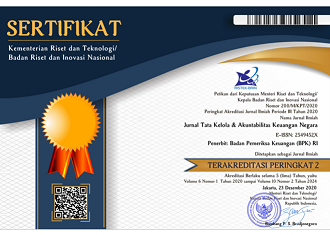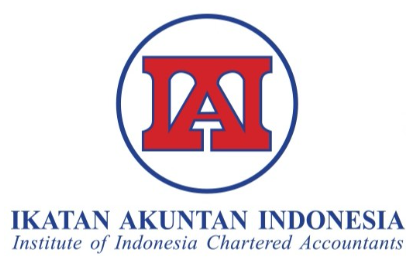ANALISIS KEBIJAKAN PUBLIK DALAM PEMERIKSAAN KINERJA
DOI:
https://doi.org/10.28986/jtaken.v1i1.20Keywords:
policy, performance audit, ex-ante, ex-post, pemeriksaan kinerjaAbstract
One of the issues in performance audit is what method to be used if the auditor wants to gain an understanding of policies underlying the entity's activities. This study aims to provide an understanding regarding the policy cycle and its development; to describe the relationship between the governance system, understanding of public policy, and performance audit; and to develop a framework and scope of public policy analysis in the performance audit. The study prepared by Tim Litbang BPK using a literature study, enriched by discussions with speakers from Vrije Universiteit, as well as field trips to ARK and other government entities in The Netherlands. Furthermore, the team developed initial information and analyzed it using ISSAI 3000 perspective. Based on the policy development cycle, the team has developed a framework for public policy analysis on performance audits. The study concluded that the ideal entity's performance evaluation would be to assess the policy before and after the policy implementation (ex-ante and ex-post). Ideally, the performance audit over policy is held by an entity other than the policy's subject itself. BPK meets the criteria.
ABSTRAK
Salah satu isu dalam pemeriksaan kinerja yang memiliki urgensi tinggi yaitu metode apakah yang dapat digunakan pemeriksa untuk mendapatkan pemahaman atas kebijakan yang melatarbelakangi kegiatan utama entitas. Analisis kebijakan publik dalam pemeriksaan kinerja ini bertujuan untuk memberikan pemahaman khususnya mengenai siklus kebijakan dan pengembangannya; menjelaskan hubungan sistem tata kelola pemerintahan, pemahaman kebijakan publik dan pemeriksaan kinerja; serta mengembangkan kerangka kerja dan menjelaskan cakupan analisis kebijakan publik dalam pemeriksaan kinerja. Kajian ini disusun oleh Tim Litbang BPK dengan menggunakan studi literatur mengenai teori-teori kebijakan publik, diskusi dengan nara sumber dari Vrije Universiteit, serta kunjungan lapangan ke Algemene Rekenkamer (ARK) dan beberapa entitas pemerintah lainnya di Belanda. Selanjutnya, Tim mengembangkan informasi awal tersebut serta menganalisisnya dengan mempertimbangkan perspektif ISSAI 3000 Performance Audit Guidelines. Dengan menggunakan siklus pengembangan kebijakan, Tim telah menyusun kerangka kerja analisis kebijakan publik dalam pemeriksaan kinerja. Hasil kajian menyimpulkan bahwa penilaian kinerja entitas yang ideal adalah dengan mengukur suatu kebijakan pada tahap sebelum dan sesudah pelaksanaan kebijakan (ex-ante dan ex-post). Pemeriksaan atas kinerja suatu kebijakan pada tahap ex-ante dan ex-post (kecuali produk kebijakan itu sendiri) secara ideal dilakukan oleh entitas pengendali yang bukan merupakan subjek kebijakan itu sendiri. BPK sebagai badan pemeriksa eksternal pemerintah memenuhi syarat tersebut.
References
Dunleavy, P. dkk. (2006). New Public Management Is Dead Long Live Digital-Era Governance. Journal of Public Administration Research and Theory. July. 16(3), 467-494. doi: 10.1093/jopart/mui057.
Dunn, W.N.(1981). Public Policy Analysis. In Fischer. F. & Miller. G.J. (2006). Handbook of Public Policy Analysis: Theory, Politics, and Methods. (p. Xix). CRC Press.
Dunn, W.N. (2012). Public Policy Analysis: International Edition. Pearson Education, Limited.
Goldfinch, S., & Wallis. J. (2009). International Handbook of Public Management Reform. Edward Elgar Publishing.
Hood, C. (1991). A Public Management for All Seasons. Public Administration, 69 (Spring), 3-19. doi: 10.1111/j.1467- 9299.1991.tb00779.x
INTOSAI. ISSAI 300. Fundamental Principles of Performance Auditing.
INTOSAI. ISSAI 3000-3100. Performance Audit Guidelines.
Lonsdale. J. dkk. (2011). Performance Auditing: Contributing to Accountability in Democratic Government. Edward Elgar Pub.
Moore, M. (1995). Creating Public Value - Strategic Management in Government. Cambridge: Harvard University Press.
Moore. M.H. (1997). Creating Public Value: Strategic Management in Government. (Reprinted.). Harvard University Press.
Nugroho, R. (2009). Public Policy: Teori Kebijakan - Analisis Kebijakan - Proses Kebijakan, Perumusan, Implementasi, Evaluasi, Revisi Risk Management dalam Kebijakan Publik sebagai The Fifth Estate - Metode Penelitian Kebijakan. Elex Media Komputindo.
Pemerintah RI. (2004). UU Nomor 15 Tahun 2004 tentang Pemeriksaan Pengelolaan dan Tanggung Jawab Keuangan Negara.
Pemerintah RI. (2013). Peraturan Menteri Perindustrian Republik Indonesia Nomor: 33/M-Ind/Per/7/2013 Tentang Pengembangan Produksi Kendaraan Bermotor Roda Empat Yang Hemat Energi Dan Harga Terjangkau.
Ruiz. E. (2009). Discriminate Or Diversify. PositivePsyche.Biz Corp.
Stranks, J.W. (2007). Human Factors and Behavioural Safety. Routledge
Stoker. G. (2003). Public Value Management (PVM): A new resolution of the democracy/efficiency tradeoff. In Goldfinch. S., & Wallis. J. (2009). International Handbook of Public Management Reform. Edward Elgar Publishing.
Talbot, C. (2006). Paradoxes and prospects of 'Public value. Paper presented at Tenth International Research Symposium on Public Management, Glasgow
Urio. P. (2012). China, the West, and the Myth of New Public Management: Neoliberalism and its Discontents. Routledge
Downloads
Submitted
Accepted
Published
How to Cite
Issue
Section
License

Jurnal Tata Kelola dan Akuntabilitas Keuangan Negara is licensed under
a Creative Commons Attribution-ShareAlike 4.0 International License




















